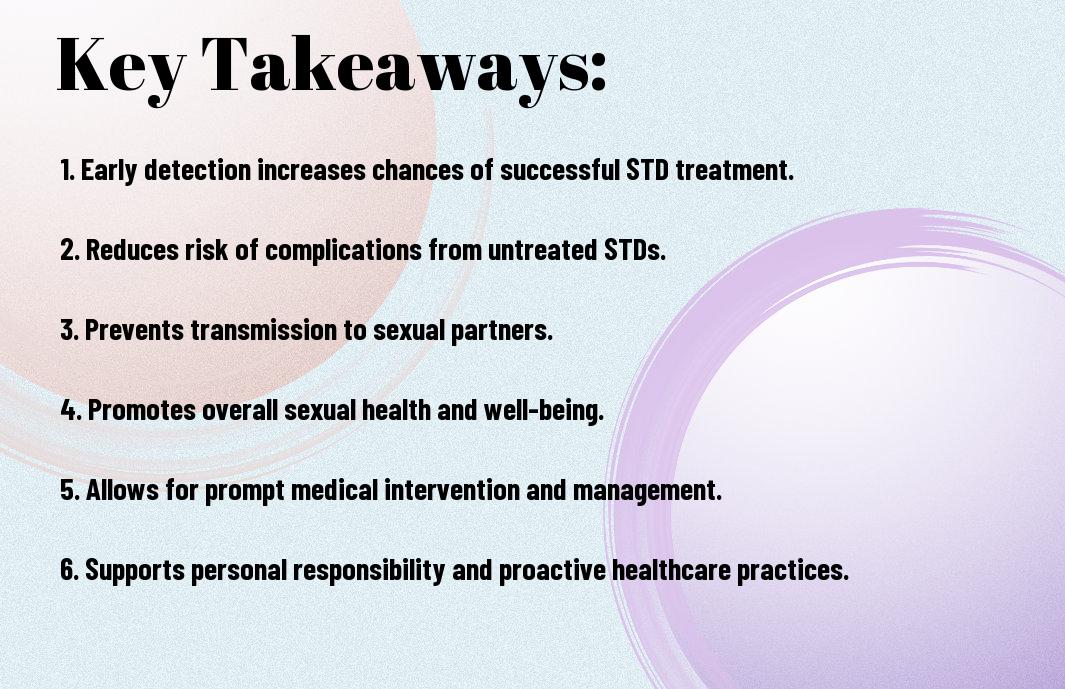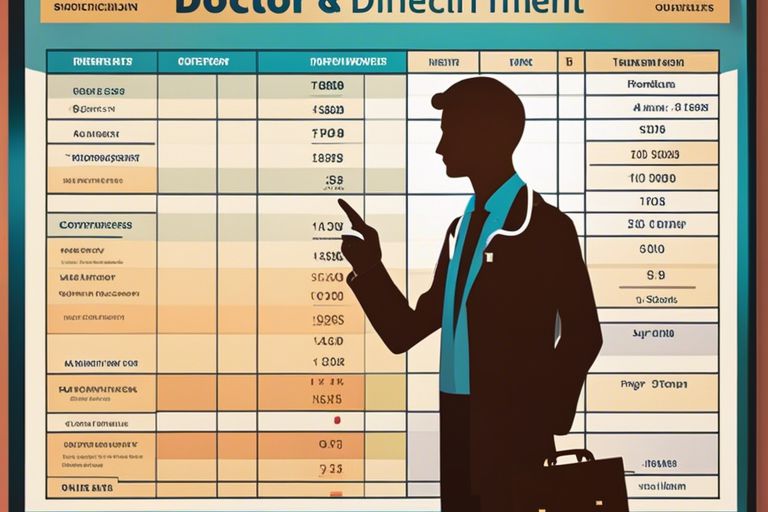With the increasing prevalence of sexually transmitted diseases (STDs) worldwide, early detection and treatment play a crucial role in preventing long-term health complications. From reducing the spread of infections to improving overall well-being, getting tested regularly can save lives. Learn more about the importance of early intervention in managing STDs and why it is crucial for everyone to prioritize their sexual health.
Key Takeaways:
- Early Detection: Detecting STDs early can lead to more effective treatment outcomes.
- Prevention of Complications: Early treatment can help prevent serious health complications associated with untreated STDs.
- Reduced Spread of Infection: Timely detection and treatment can reduce the risk of spreading STDs to others.
- Peace of Mind: Knowing your STD status can provide peace of mind and reduce anxiety about potential health risks.
- Improved Overall Health: Early treatment of STDs can contribute to better overall health and well-being.

Importance of Early Detection
For a comprehensive understanding of the importance of early STD detection and treatment, it is crucial to consider YOUNG WOMEN’S PERSPECTIVE OF THE PROS AND …. Early detection can significantly reduce the risk of complications associated with untreated STDs, thereby enhancing overall health outcomes. Regular screening and timely treatment can help prevent the spread of infections and minimize the impact on individuals and public health.
Reduces Risk of Complications
Importance: Early detection of STDs plays a pivotal role in reducing the risk of complications that can arise from untreated infections. STDs, if left undetected and untreated, can lead to serious health issues such as infertility, pelvic inflammatory disease, chronic pain, and an increased risk of HIV transmission.
Prevents Long-term Damage
Damage: Early STD detection and treatment not only reduce the risk of complications but also prevent long-term damage to reproductive organs and overall health. A timely diagnosis can help in avoiding irreversible harm caused by certain STDs, allowing individuals to maintain their well-being and quality of life.
Improves Treatment Outcomes
Increases Effectiveness of Medication
While early detection of STDs is crucial for several reasons, one significant advantage is the increased effectiveness of medication when treatment is initiated promptly. STDs are highly responsive to treatment in their early stages, making it easier to eliminate the infection and prevent further complications. Initiating treatment as soon as the infection is detected can help prevent the spread of the disease to others and minimize the impact on the individual’s health.
Reduces Likelihood of Resistance
Any delay in seeking treatment for STDs can increase the risk of developing resistance to certain medications. Resistant strains of STDs are a growing concern in the medical community and can pose significant challenges in treatment. By detecting and treating STDs early, the likelihood of resistance development is significantly reduced.
Increases in antibiotic-resistant gonorrhea strains have been reported in recent years, highlighting the importance of early detection and treatment to combat this concerning trend. By promptly addressing STDs, individuals can reduce the risk of developing resistance and improve their overall treatment outcomes.

Enhances Sexual Health
Now, one of the key benefits of early STD detection and treatment is the enhancement of sexual health. By identifying and addressing STDs promptly, individuals can prevent further spread of infections and protect both themselves and their partners. This proactive approach not only helps to maintain physical well-being but also promotes overall sexual well-being.
Promotes Healthy Relationships
Enhances healthy relationships. When individuals prioritize early STD detection and treatment, they demonstrate respect, trust, and care for their partners. Open communication about sexual health can strengthen the bond between partners and foster a supportive and understanding relationship. By taking responsibility for their sexual health, individuals contribute to a positive and trusting dynamic in their relationships.
Boosts Self-Esteem
On the other hand, early detection and treatment of STDs can have a significant impact on an individual’s self-esteem. Dealing with an STD diagnosis can be challenging, but seeking timely medical care shows courage and self-respect. By taking proactive steps to address their health, individuals demonstrate a commitment to their well-being and empower themselves to overcome any obstacles that come their way.
With proper education and access to healthcare services, individuals can not only protect themselves from the negative effects of untreated STDs but also promote their overall well-being and quality of life.
Prevents Transmission
Once again, early STD detection and treatment play a crucial role in preventing the transmission of sexually transmitted infections. By identifying and treating STDs promptly, individuals can avoid spreading the infection to their partners.
Protects Partners from Infection
With timely detection and treatment of STDs, individuals can protect their partners from contracting the infection. Undiagnosed and untreated STDs can easily be transmitted to sexual partners, leading to serious health consequences. Taking proactive steps to address any potential STDs not only safeguards one’s health but also shows respect and care for their partners.
Reduces Risk of Epidemics
With early STD detection and treatment, there is a significant reduction in the risk of STD epidemics. STDs can spread rapidly within communities if left untreated, causing widespread health issues and straining healthcare resources. By addressing infections early on, individuals can help prevent the spread of STDs on a larger scale.
Transmission of STDs can lead to outbreaks within populations, posing a serious public health concern. Early detection and treatment are vital in controlling the spread of sexually transmitted infections and avoiding potential epidemics.
Reduces Healthcare Costs
Minimizes Hospitalization and Surgery
To minimize the need for hospitalization and surgery, early STD detection and treatment is crucial. Untreated STDs can progress to more severe stages, requiring intensive medical interventions that can be costly. By catching STDs early, individuals can avoid the complications that may lead to hospital stays and surgical procedures.
Lowers Pharmaceutical Expenses
To lower pharmaceutical expenses, early STD detection and treatment are necessary. When STDs are left untreated, the infections can cause serious complications that require costly medications to manage. By addressing STDs early, individuals can reduce their reliance on expensive pharmaceutical treatments, ultimately saving on healthcare expenses.
Pharmaceutical expenses can add up quickly when treating advanced stages of STDs. These medications are often long-term, and the costs can accumulate over time. By detecting and treating STDs early, individuals can avoid the need for prolonged and expensive pharmaceutical regimens.
Improves Mental Health
Reduces Anxiety and Stress
For many individuals, the fear of having a sexually transmitted disease (STD) can lead to significant anxiety and stress. Early STD detection and treatment play a crucial role in alleviating these mental health burdens. Knowing your status early on can provide a sense of relief and peace of mind, reducing anxiety about potential health risks and transmission to others.
By addressing the issue promptly, individuals can avoid prolonged worry and uncertainty. The sooner STDs are detected and treated, the less time there is for psychological distress to take a toll on mental health. Regular testing and early treatment can help individuals feel more in control of their sexual health, leading to a decrease in overall anxiety levels.
Enhances Overall Well-being
For many people, good health encompasses both physical and mental well-being. Early detection and treatment of STDs not only prevent the progression of the infection but also contribute to an individual’s overall quality of life. By taking proactive steps to address their sexual health, individuals can experience a sense of empowerment and self-care.
Mental health and physical health are intricately connected, and untreated STDs can have a significant impact on both. By seeking early treatment for STDs, individuals are not only safeguarding their physical health but also promoting their mental well-being, leading to a more fulfilling and balanced life.
Mental well-being is a crucial component of overall health, and addressing any concerns related to sexual health can lead to a sense of relief and confidence. By prioritizing early STD detection and treatment, individuals can protect both their physical health and mental well-being, setting the foundation for a healthier and happier life.
To wrap up
With these considerations in mind, it is evident that early detection and treatment of STDs have numerous benefits. From preventing the spread of infections to reducing the risk of long-term health complications, getting tested regularly can lead to overall improved health outcomes. By being proactive about sexual health and seeking medical attention promptly, individuals can better protect themselves and their partners. Bear in mind, early detection is key in effectively managing and treating sexually transmitted diseases.
FAQ
Q: What are the benefits of early STD detection?
A: Early STD detection allows for prompt treatment, which can prevent the spread of the infection to others and reduce the risk of long-term health complications.
Q: How can early STD detection benefit my overall health?
A: Early STD detection can help prevent serious health issues such as infertility, pelvic inflammatory disease, and certain types of cancer that can result from untreated STDs.
Q: What are the common methods used for early STD detection?
A: Common methods for early STD detection include laboratory tests such as blood tests, urine tests, swab tests, and physical examinations by a healthcare provider.
Q: How soon should I get tested for STDs after potential exposure?
A: It is recommended to get tested for STDs as soon as possible after potential exposure, as early detection and treatment can significantly impact the outcome of the infection.
Q: Can early STD detection help in preventing the spread of infections?
A: Yes, early STD detection allows for the initiation of treatment to prevent the spread of infections to sexual partners and can help in breaking the chain of transmission in the community.



